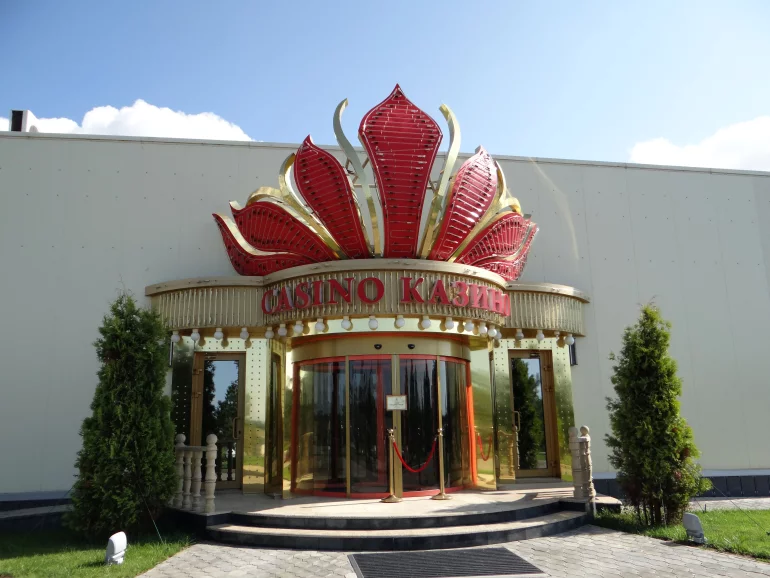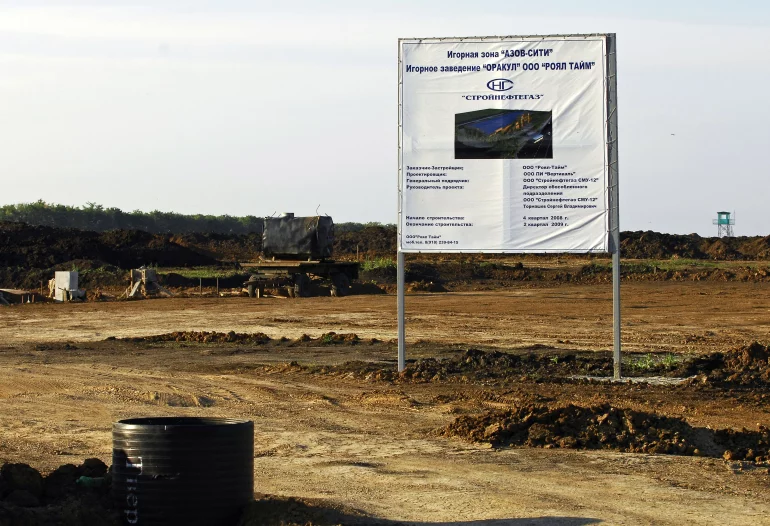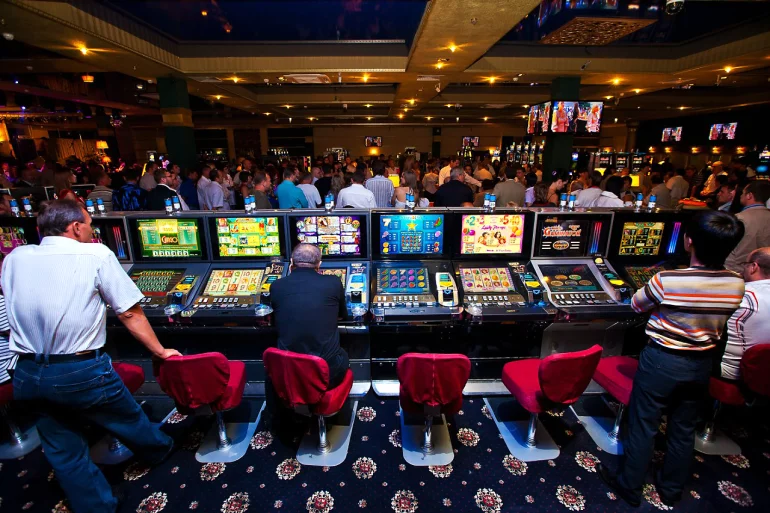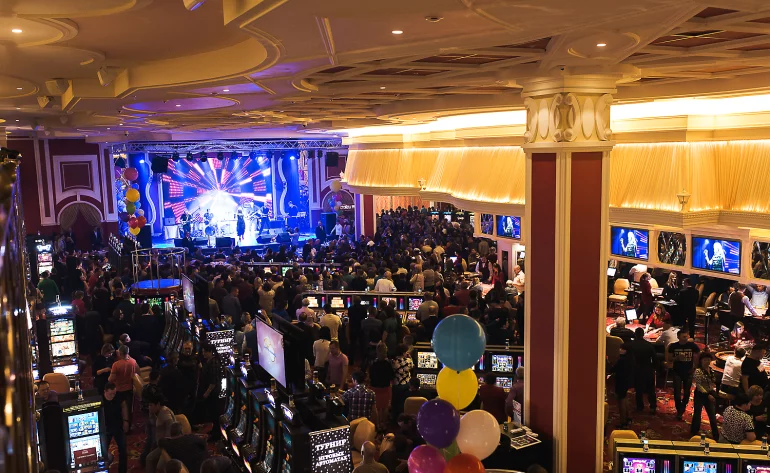
Gambling was banned in Russia in 2009. It occurred even though the gambling industry was awe-inspiring at that time: according to estimates of experts, the volume of the Russian market in 2007 reached 4.6 billion dollars and occupied the second-leading position in Europe, following the United Kingdom. However, this fact did not prevent the authorities from eliminating the promising industry. Four gaming zones were prepared for fans of gambling:
- Altay - Siberian Coin.
- Kaliningrad Region - Yantarnay.
- Rostov region – Azov City.
- Primorsky Krai - Primorye.
This happened 6 years ago, and now it seems that the history of one of the most successful gaming zones, Azov City, has come to an end.
I Remember How Everything Began...
The construction of Azov City was started from scratch: the nearest town of Yeysk is located 90 kilometers from the gaming zone, Rostov-on-Don is located 200 kilometers away from it, and the distance to Krasnodar is 270 km. Yet, it did not confuse investors. They began to work enthusiastically: the first Oracle Casino was opened in January 2010. It was built by the company from Kazan called the Royal Time Group. In October of the same year, the second casino called Shambala was constructed. The Krasnodar Shambala Company owned it. Azov City became the first active gaming zone.

The construction of the casino served as an incentive to develop the region. It was apparent since the federal budget provided 80 billion rubles for these purposes. Gas and water pipes, new power lines, and high-speed highway, airport, and sea transport infrastructure were built. All of these changes contributed to the investment attractiveness of the region: house prices and land values skyrocketed.
Shambala CJSC opened its second casino called Nirvana in 2013, and the Royal Time Group launched the third phase of Oracle Casino in 2014 (the second phase was finished in September 2010). Investors successfully developed their business and thought about the future. Nothing indicated the possible trouble.
Figures and Prospects
The best way to assess the activities and prospects of the Azov City gaming zone is to provide figures.- Three kinds of Oracle Casinos, whose total area reached 7,900 square meters, with halls for 40 tables and 850 slot machines, a hotel with 90 rooms, and a spa were available for visitors;
- Growth in the number of visitors: in 2010, Azov City was attended by over 45 thousand visitors. Their number reached 122 thousand in 2011. In 2012, 185 thousand players visited this gaming zone. Over 400 thousand players gambled in Azov City in 2013. In 2014, their number reached 600 thousand. The owners of Azov City expect to see over 1 million visitors in 2015.
- The Royal Time Group invested over 2.3 billion rubles in this project.
- The Shambala Company invested 1.2 billion rubles in the development of this gaming zone by building two casinos, each with an area exceeding 1,500 square meters. At the end of 2014, the second phase of Shambala Casino was being built. The company decided to increase the casino area to up to 19,000 square meters, build restaurants, concert halls, and a five-star hotel with 120 rooms. The owners of the company wanted to invest about 1.5 billion rubles.
- Azov City has three casinos, two hotels, and four restaurants. The number of their employees reaches 12% of the working-age population of the Shcherbinovsky district, i.e., roughly 2,500 individuals;
- The total amount of taxes obtained from gambling for the Krasnodar Krai budget is 300 million rubles per year.
- The Royal Time Group started building a concert hall with a total area of 10,000 sq m. It will cost 1.1 billion rubles. It is supposed to be opened at the end of 2015.
- The Royal Time Group and the U.S. architectural firm Steelman Partners developed a project. They began preliminary construction work on the first phase of the integrated gaming resort, with a total area of 80,000 sq. m and 250 hotel rooms. They also have an intention to build an entertainment complex whose area will reach 45,000 sq m. It will have casino halls (15,000 sq. m.) and 400 hotel rooms on the remaining territory. The construction of two complexes may require investing over 10 billion rubles. The building will have been finished by 2018.
Unfortunately, these excellent prospects will never come true, and the existing casinos will likely be closed.
First Negative Signs
On July 22, 2014, the State Duma of the Russian Federation made amendments to the Federal Law "On the State Regulation of Activities Associated with the Organization of and Carrying On Gambling and On Amending Individual Legislative Acts of the Russian Federation", which provided the creation of two gaming zones: Crimea and Sochi.
_770.webp)
The more gambling zones, the better. This will provide competition among them. Regardless, the former World Chess Champion Anatoly Karpov made one cunning amendment to this law. According to it, gambling zones in Krasnodar Krai can be located only on the territory provided for the construction of Olympic objects of federal significance, i.e., in Sochi. Thus, the Azov City gaming zone became illegal.
This caused a wave of panic among investors. They were shocked. Why is it necessary to eliminate the successful gaming zone? Deputy Marketing Director of CJSC Shambala, David Bagiyan, said:
It is obvious that Azov City cannot compete with Sochi. They are intended for different audiences. Our gaming zone focuses on local gamblers, who are residents of nearby towns. Players from Moscow and St. Petersburg will probably fly to Krasnaya Polyana."
At that time, investors still hoped that Azov City would not be eliminated. Deputy Prime Minister Dmitry Kozak gave hope to investors in the gaming zone:
"The Azov City gaming zone in the Krasnodar Krai may be closed, but we are still discussing this issue."
It was calculated in the Ministry of Finance that the payment of compensation to investors, compensation for investments made in the regional infrastructure, as well as legal costs, would reach at least 10 billion rubles. These costs were found to be impermissible, and the Russian Ministry of Finance published amendments to the Federal Law №244 on August 11, 2014. According to them, Azov City could operate, bypassing the amendments adopted on July 22, 2014.
A representative of CJSC Shambala commented on this fact in the following way:
"Common sense has beaten the rumors. The Azov City gaming zone is active. It is developing, and there are no reasons to close it. It is a socially significant object for the entire region. We pay taxes and provide jobs for more than 2,500 employees. The second phase of Shambala Casino will have been opened by August 2015. We are talking about an entertainment complex whose total area will reach 19 thousand square meters."
Alas, this draft law has not become a law, and the rumors have beaten common sense.
Black December
In December 2014, holders of the Azov City gaming zone received a letter from the Minister for Strategic Development of Krasnodar Krai, Alexei Sheyan, in which they were informed that they were obliged to eliminate the gaming zone by April 1, 2015. It was mentioned in the letter that the liquidation procedure had to occur after the appearance of a special resolution approved by the Government of the Russian Federation. This resolution terminated investors’ gambling licenses.

The Ministry of Finance of the Russian Federation also confirmed that Azov City was supposed to be closed and reported that the documents for the liquidation of Azov City were about to be prepared.
The Investors’ Council of Azov City was shocked. Its members hoped that the true purpose of the changes in the Federal Law №244 was the creation of new gambling zones in Crimea and Sochi. They couldn't believe that Azov City could be ruined. Investors hoped that it was possible to rectify this error.
"Why is it necessary to ruin something that is operating successfully just to move it to another place? After all, nowadays the Azov City gaming zone does not require any investments from the state. On the contrary, it brings money to the treasury of the region. The market itself should determine the future of this gaming zone. This will be fair and will not affect the investment attractiveness of the country and the region", - says David Bagiyan.
Inhabitants of Shcherbinovsky and Yeysk districts, for whom Azov City is almost the only opportunity to earn, seem to be indeed disappointed. As soon as they became aware of the probable closure of the gaming zone, they wrote an open letter to the governor of Krasnodar Krai:
"Most employees of our team are residents of Kuban. There are mainly residing in Yeysk, Shcherbinovsky districts, Krasnodar, and Timashyovsk. We need your support and protection. Nowadays, it is very difficult to find the ways to earn money against the background of the economic and political situation. We are afraid of losing our jobs. If Azov City is closed, it will be a real disaster."
Complaints from the local population were also addressed to deputies of the District Council. So, deputies of the Shcherbinovsky district sent a letter to the Government of the Russian Federation with a request to change an unpopular decision to close this gaming zone. This request is motivated by the fact that Azov City provides five thousand people with jobs, and the further construction of resort infrastructure will give jobs to several tens of thousands of people who are suffering from the crisis and are dependent on the state.
"To prevent huge job cuts in Azov City and avoid increasing the unemployment rate in the Shcherbinovsky district, and taking into account the fact that the development of gaming zone contributes to the development of the infrastructure of surrounding towns, including housing and utilities, we must send a request to the Legislative Assembly of Krasnodar Krai and the Administration of Krasnodar Krai to save the boundaries of the Azov City gaming zone " – is reported in the Minutes of the special 92nd session of the Municipal Board in the Shcherbinovsky district.
This decision was taken unanimously.
Why Azov City is Supposed to Be Closed?
There are two versions concerning the reasons to close the profitable gaming zone. The first one sounds unreal and does not hold water: Azov City is going to be closed following the law that allows having only a single gaming zone in one region.

The second version resembles conspiracy theories. According to it, the interests of regional and federal authorities, investors, and owners are intertwined. It is a difficult task to understand all these intricacies and find those "who may benefit." As an example that confirms this version, it is possible to provide a quote from Maxim Smolentsev, the CEO of Shambala CJSC. He thinks that the authorities are closing Azov City, sacrificing it for the gaming zone in Sochi.
According to him, it can be opened in the resorts of Rosa Khutor (its investor is Interros, owned by Vladimir Potanin) or Gorki Gorod (its investor is Sberbank), which the NAO Krasnaya Polyana controls. It should be noted that the founder of NAO Krasnaya Polyana that is the Municipal Property Management Committee of Sochi may not be involved in gambling by §2, Ar.6 of the Federal Law № 244.
"Krasnaya Polyana will probably rent this area. Perhaps Azov City is eliminated on behalf of an unknown tenant" - suggests Maxim Smolentsev.
Showdowns between the authorities of Kuban and the Royal Time Company also confirmed the second version. The Department for Property Relations of the Krasnodar Krai submitted six collection lawsuits for debts reaching millions for renting the land by the Royal Time Company, which was a subsidiary enterprise of the leading investor of the Azov City gaming zone, to the regional Arbitration Court in April.
What is Happening Now?
According to the requirements of the Ministry of Finance, all casinos in the gaming zone are obliged to cease operations as of April 1. However, Azov City is still open at the moment. How long will this last? - No one knows. Nevertheless, it became clear in mid-May that the Royal Time Group had frozen the development of new investment projects in the gaming zone. Olga Khalitova, Head of PR Department of the company, reported:
"The decision is explained by the uncertainty in the fate of the gaming zone. The frozen objects exist at the stage of finished projects that have been developed by U.S. specialists."
She also reported that:
"The mechanism of compensation for investments to residents of the gaming zone, as well as terms of liquidation and compensation measures, is not defined. As a result, investors of Azov City find themselves in a situation of the legal uncertainty concerning their further investment activities."
_770.webp)
So, there is a strange situation. Investors are speaking about the legal uncertainty. Authorities don’t say a word. According to representatives of the Royal Time Group, we can conclude that the decision on the elimination of Azov City has already been approved, and it is just necessary to select "the terms of liquidation and compensation measures."
| Casino | Bonuses | Editors rating | |||
| 100% to 100 $ x35 |
Play
T&C applies, 18+
|
||||
| — |
Play
T&C applies, 18+
|
||||
| — |
Play
T&C applies, 18+
|
||||
| — |
Play
T&C applies, 18+
|
||||
| 100% to 400 $ x50 |
Play
T&C applies, 18+
|
The End
The closure of the Azov City gambling zone was a multi-stage process driven by changes in Russian federal law and the government's shifting priorities. The initial legal framework for gambling zones, established in 2007, stipulated that only one such zone could exist within a single administrative region. The decision to create a new gambling zone in Sochi following the 2014 Winter Olympics put Azov City's future in jeopardy, as both zones were located in the Krasnodar Krai region.
Following the announcement of the new Sochi zone, the Russian government began the process of liquidating Azov City. While the initial legislation and governmental decrees set deadlines for the zone's closure, these were often postponed to allow casino operators more time to recover their investments. The final decision to close the zone was confirmed by an official order from the Prime Minister.
Throughout this period, there was considerable legal dispute and uncertainty, as casino operators who had invested heavily in Azov City filed lawsuits and sought compensation for their losses. Despite these efforts, a new law regarding investor compensation did not include Azov City, and the zone ultimately ceased all operations on December 29, 2018.
























